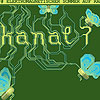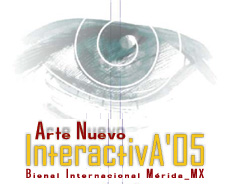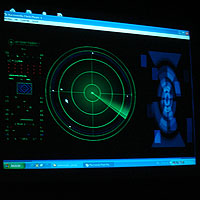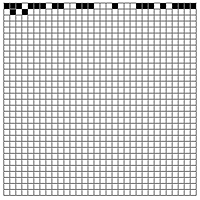:: Wednesday, August 10, 2005 ::
 ::NET.TEN:: \\Online Selections//
::NET.TEN:: \\Online Selections//BY: Annina Rüst
This month Net Art Review invites Annina Rüst to recommend ten online resources to our readers.
Click here to read Rüst's recomendations

SPECIAL REPORT.REVIEW:
INTERACTIVA 05,
THE POSTCOLONIAL DILEMMA OF INTEGRATION VS. OPPOSITION
BY: Eduardo Navas
The biennale InteractivA 05 took place for the third consecutive time in Merida, Yucatan, Mexico. Raul Ferrera Balanquet was the executive curator; Lucrezia Cippitelli and Gita Hashemi were the invited curators. Artists from different countries participated contributing works that included installations as well as Internet projects (for a complete list of artists, please see the InteractivA 05 website). This was by far the most ambitious and best organized InteractivA, yet. The biennale not only consisted of an exhibition in three major galleries of the Centro Cultural Olympo in Downtown Merida, but it also included a series of conferences which took place over nine days, from July 16--25.
Click here to read the entire feature
 SPECIAL FEATURE.COMENTARY:
SPECIAL FEATURE.COMENTARY:INTERACTIVA '05 O LA EXISTENCIA DE MERIDA/
INTERACTIVA '05 OR MERIDA'S EXISTENCE
BY: Raquel Herrera Ferrer
I was surprised, from my let's call it "barcelonian" point of view, of the constant debate articulated around "postcolonial" issues, and of how a biennal like Interactiva wasn't considered only as an "act of faith" but as a "political act" too. However, I have the impression that this double approach vertebrating the possible interpretations of the sense, survival and sustainable quality of Interactiva towards its future would put aside a very important reverse: independence as a choice, as a preference, as a "relief" from a pressing and suffocating art "Establishment".
Me sorprendio desde digamos mi "barcelonismo" el debate constante que se articulo entorno a cuestiones "poscoloniales", y de como en estos terminos una bienal como Interactiva constituia no solamente un "acto de fe", sino tambien un "acto politico". Sin embargo, tengo la impresion de que este planteamiento que vertebraba una y otra vez las eventuales interpretaciones sobre el sentido, la pervivencia, la sostenibilidad de Interactiva de cara al futuro dejaba de lado un reverso muy importante: la independencia como eleccion, como preferencia, como alivio frente a un establishment que aprieta y a menudo ahoga.
Click here to read the entire feature
 FEATURE.REVIEW: In Some Parts of the World, It's 1996 all Over Again
FEATURE.REVIEW: In Some Parts of the World, It's 1996 all Over Again BY: Kristen Palana
The problem with the Utopia that is the Internet is that it has only been available to a small percentage of the world's population. For Net Artists it means that maybe we're not always reaching the audience we want. If traditional Fine Art galleries are for the rich and well connected, the Internet (like a street mural) was supposed to be the ultimate gallery and forum accessible to the masses. In the United States and in Industrial countries, it IS accessible. Even though there still exists a technological divide between the rich and poor, nearly everyone in an Industrial Country can walk into their local library and ...voila! -Connection-information-communication- and random time wasting cartoons and games are at our fingertips. Even my parents know how to do it. My dad likes those Shockwave slot machine games...
Click here to read the entire feature
 In an ongoing collaboration, this month NAR features another .PDF originally published in a minima::, a media and contemporary art publication based in Spain. This month features "Not-Art: Learning from computers is not the next but actually the now big thing of 'post-modern', 'post-human' art."
In an ongoing collaboration, this month NAR features another .PDF originally published in a minima::, a media and contemporary art publication based in Spain. This month features "Not-Art: Learning from computers is not the next but actually the now big thing of 'post-modern', 'post-human' art."I took the expression Not-Art from a Terry Atkinson essay on the possibility of a post-pictorialist, informational art practice that would have to be carried on by a new artist specimen, other than the one modeled upon the bleeding ear of Van Gogh. Significant parts of Terry's essay were transcripted into this brief memo on the future of art in a world submitted to an expanding and pervasive cybernetic paradigm.
Click here to download the .PDF file
